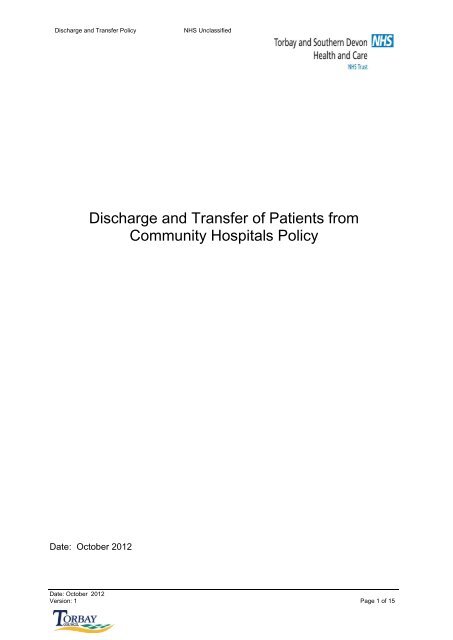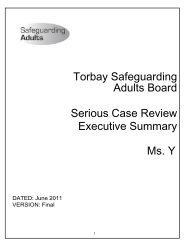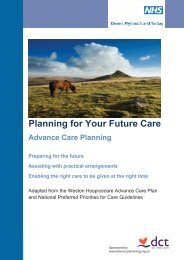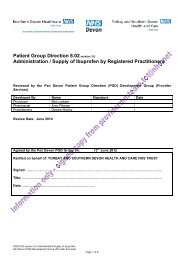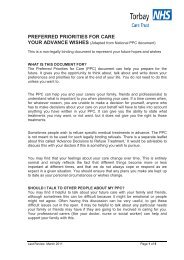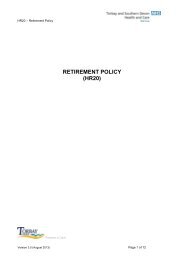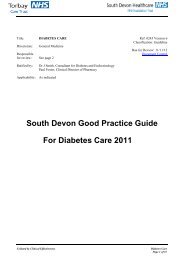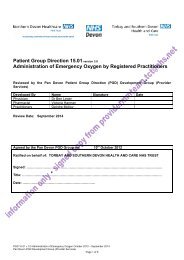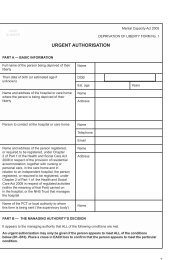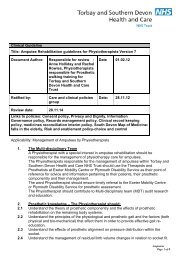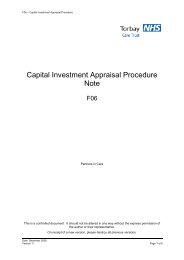Discharge and transfer policy - Torbay Care Trust
Discharge and transfer policy - Torbay Care Trust
Discharge and transfer policy - Torbay Care Trust
Create successful ePaper yourself
Turn your PDF publications into a flip-book with our unique Google optimized e-Paper software.
<strong>Discharge</strong> <strong>and</strong> Transfer Policy<br />
NHS Unclassified<br />
<strong>Discharge</strong> <strong>and</strong> Transfer of Patients from<br />
Community Hospitals Policy<br />
Date: October 2012<br />
Date: October 2012<br />
Version: 1 Page 1 of 15
<strong>Discharge</strong> <strong>and</strong> Transfer Policy<br />
NHS Unclassified<br />
Partners in <strong>Care</strong><br />
This is a controlled document. It should not be altered in any way without the express permission of the<br />
author or their representative.<br />
On receipt of a new version, please destroy all previous versions.<br />
Document Information<br />
Date of Issue: October 2012 Next Review Date: October 2013<br />
Version: 1 Last Review Date: October 2012<br />
Author:<br />
Birgit Morrison/Tracey McKenzie<br />
Directorate: Community Hospital Operational<br />
Approval Route<br />
Approved By: <strong>Care</strong> <strong>and</strong> Clinical Policies Group Date Approved:<br />
<strong>Care</strong> <strong>and</strong> Clinical Policies Group 24/10/12<br />
Links or overlaps with other strategies/policies:<br />
<strong>Care</strong> Quality Commission Outcomes<br />
Community <strong>Care</strong> (Delayed <strong>Discharge</strong>s) Act 2003<br />
Consent Policy<br />
Clinical H<strong>and</strong>over of <strong>Care</strong> Policy 2012<br />
Infection Control Policies <strong>and</strong> Procedures<br />
Medicines Management Policy<br />
Mental Capacity Act 2005 Policy <strong>and</strong> associated Deprivation of Liberty Safeguards Policy <strong>and</strong><br />
Codes of Practice<br />
National <strong>Care</strong>rs Strategy<br />
National Framework for NHS Continuing Healthcare <strong>and</strong> NHS funded Nursing <strong>Care</strong><br />
Transfer Policy - 2011 (<strong>Torbay</strong> <strong>Care</strong> <strong>Trust</strong>)<br />
<strong>Discharge</strong> documentation: <strong>Discharge</strong> Checklist, <strong>Discharge</strong> medicines chart (on icare)<br />
Amendment History<br />
Issue Status Date Reason for Change Authorised<br />
1 Final July 2012 Review <strong>and</strong> change of existing TCT<br />
Transfer <strong>policy</strong> for new<br />
organisation.<br />
24/10/12<br />
Date: October 2012<br />
Version: 1 Page 2 of 15
<strong>Discharge</strong> <strong>and</strong> Transfer Policy<br />
NHS Unclassified<br />
Contents<br />
no<br />
Pages<br />
1 Introduction 3<br />
2 Statement/Objective 3<br />
3 Roles <strong>and</strong> Responsibilities 4-7<br />
4 Infection Control 7<br />
5 Mental Capacity 7<br />
6 Learning Disabilities 7<br />
7 Mental Health 8<br />
8 Non English speaking/Sensory Deficits 8<br />
9 Delayed <strong>Discharge</strong>/Transfer of care 8<br />
10 Reporting 9<br />
11 Patient preparation for <strong>Discharge</strong>/Transfer process. 9<br />
12 Monitoring <strong>and</strong> Evaluation 10<br />
13 Training 10<br />
14 References 10<br />
15 Patient <strong>Discharge</strong> information booklet 11<br />
1. Introduction<br />
1.1 The rationale for this <strong>policy</strong> is to ensure that patients shall be safely <strong>transfer</strong>red or<br />
discharged from all <strong>Torbay</strong> <strong>and</strong> Southern Devon Community hospitals to an appropriate<br />
environment utilising a person centred approach.<br />
1.2 Hospital discharge <strong>and</strong>/or inter hospital <strong>transfer</strong> planning should be provided whilst<br />
taking into account the complexity <strong>and</strong>/or acute medical needs of the patient.<br />
1.3 The scope of the <strong>policy</strong> applies to all adult patients requiring <strong>transfer</strong> <strong>and</strong> discharge to<br />
locations in <strong>and</strong> out of <strong>Torbay</strong> <strong>and</strong> Southern Devon Community Hospitals.<br />
1.4 This <strong>policy</strong> applies from the point of admission to community hospitals when the<br />
discharge process commences.<br />
2. Statement/Objective<br />
2.1 To maximise patient safety <strong>and</strong> minimise risk.<br />
2.2 To assess patients prior to <strong>transfer</strong> <strong>and</strong>/or discharge thereby ensuring the patients’<br />
individual needs will continue to be met in the new environment.<br />
2.3 To ensure patients <strong>and</strong> carers are partners in the <strong>transfer</strong> or discharge process <strong>and</strong> will<br />
be fully involved when making explicit decisions about future care settings where<br />
possible.<br />
2.4 To maintain ongoing communication between primary care, secondary care <strong>and</strong> other<br />
partners in the patient’s <strong>transfer</strong> where appropriate.<br />
This should be: Timely, contemporaneous, appropriate, accurate <strong>and</strong> auditable whilst<br />
avoiding abbreviations <strong>and</strong> including all ongoing care requirements.<br />
Date: October 2012<br />
Version: 1 Page 3 of 15
<strong>Discharge</strong> <strong>and</strong> Transfer Policy<br />
NHS Unclassified<br />
2.5 To ensure the <strong>transfer</strong> <strong>and</strong> discharge process involves appropriate; personnel,<br />
equipment provision, documentation, referrals <strong>and</strong> medication.<br />
2.6 To ensure where a mental capacity assessment is required this will have been<br />
completed during the admission process. In the event of an urgent <strong>transfer</strong> the<br />
professional will, if possible, complete the best interest assessment.<br />
2.7 To reduce <strong>and</strong> prevent delayed discharges by utilising appropriate policies <strong>and</strong><br />
procedures <strong>and</strong> discuss with clinical <strong>and</strong> social care managers as soon as any delay is<br />
identified.<br />
3. Roles & Responsibilities<br />
3.1 Assistant director of community hospitals is responsible for ensuring the discharge<br />
systems <strong>and</strong> processes are effective, efficient <strong>and</strong> adhered to.<br />
3.2 Community hospital matrons are responsible for ensuring discharge processes meet the<br />
required st<strong>and</strong>ards set by the organisation <strong>and</strong> are embedded in clinical practice.<br />
3.3 Ward managers or the nurse in charge are responsible for ensuring the discharge<br />
processes are operationalised <strong>and</strong> embedded in daily work.<br />
3.4 Community hospital clinical staff are responsible for adhering to the <strong>Discharge</strong> <strong>policy</strong>.<br />
Transport:<br />
3.5 The Ambulance/Patient Transport services will require information in order to determine<br />
transport requirements with regards to the patient’s individual needs, including<br />
infections, oxygen etc.<br />
3.6 A paramedic (9)999 ambulance crew must be called to <strong>transfer</strong> any clinically unstable<br />
patient requiring immediate emergency treatment <strong>and</strong> <strong>transfer</strong> to the acute care trust.<br />
3.7 A paramedic 2-4 hour ambulance crew must be called to <strong>transfer</strong> any patient requiring<br />
an urgent/unplanned specialist review, intervention or admission to the acute care trust<br />
as deemed necessary by a GP/ doctor in charge of the patient’s care.<br />
3.8 Transport to outpatient department appointments should be arranged as soon as the<br />
appointment is confirmed.<br />
3.9 Staff arranging patient transport should, ideally, call before 1pm for same day transport.<br />
3.10 Staff should arrange transport home or to the ongoing care provider at the earliest<br />
opportunity after the patient is deemed fit for discharge.<br />
3.11 Where appropriate, relatives or friends should be approached to collect the patient from<br />
the hospital setting.<br />
3.12 All staff involved in arranging patient <strong>transfer</strong>s/discharges should be aware of the<br />
procedures <strong>and</strong> ensure that all relevant staff, patients <strong>and</strong> carers are informed of the<br />
<strong>transfer</strong>/discharge date <strong>and</strong> time.<br />
Date: October 2012<br />
Version: 1 Page 4 of 15
<strong>Discharge</strong> <strong>and</strong> Transfer Policy<br />
NHS Unclassified<br />
3.13 Staff escorting patients should be aware of the procedures to be followed <strong>and</strong> be<br />
competent to undertake the <strong>transfer</strong>.<br />
3.14 Staff receiving patients into their department should be able to accept the patient on<br />
arrival <strong>and</strong> ensure that all patients needs can be met following <strong>transfer</strong>.<br />
3.15 Out of hours <strong>transfer</strong>s (after 5pm) should be undertaken only when absolutely<br />
necessary. The procedure, however, will remain the same.<br />
3.16 Exclusions to this process include patients attending a department in another hospital<br />
for investigation.<br />
Medical Staff:<br />
3.17 Where appropriate medical staff should inform the patient, carers or relatives of the<br />
decision to <strong>transfer</strong> a patient to another care provider.<br />
3.18 Medical staff should ensure that when a patient is deemed medically fit for discharge<br />
this is documented clearly in the notes <strong>and</strong> is timed, dated <strong>and</strong> signed.<br />
3.19 Following a multidisciplinary team (MDT) agreement to discharge a patient, the doctor<br />
is required to complete the discharge medication documentation, prescribing a 28 day<br />
supply of relevant medication.<br />
3.20 It is the responsibility of the discharging/<strong>transfer</strong>ring doctor to provide a written record of<br />
the initial reason for the patients admission, diagnosis, medication prescribed at the time<br />
of discharge, including medication discontinued <strong>and</strong> additions made during the<br />
admission including the rationale. <strong>Care</strong> provided during the admission <strong>and</strong> requirements<br />
for immediate <strong>and</strong> on -going needs post discharge e.g. INR monitoring , planned follow<br />
up ,infections where applicable <strong>and</strong> contact details of the responsible medical<br />
practitioner for any post discharge queries. The correspondence must include the<br />
details of the need to <strong>transfer</strong> (if applicable), the confirmed date of discharge/<strong>transfer</strong>,<br />
any outst<strong>and</strong>ing referrals/appointments tests <strong>and</strong> investigations <strong>and</strong> clear guidance on<br />
follow up requirements <strong>and</strong> frequency e.g. Reducing dose of medication commenced<br />
such as amiodorone after initially loading doses.<br />
3.21 It is the responsibility of the attending doctor to complete the full discharge summary<br />
within 24 hours of discharge.<br />
Nursing Staff:<br />
3.22 The admitting nurse should initiate a discharge checklist within 24 hrs of the patient’s<br />
admission to a community hospital. (icare -Community Hospital Documentation).<br />
3.23 The decision to <strong>transfer</strong> a patient to another hospital should normally be made by the<br />
GP/ doctor in charge of the patient’s care, however in an emergency situation the nurse<br />
in charge may make this decision.<br />
3.24 The communication for urgent <strong>transfer</strong>s to an acute unit must be made utilizing all<br />
relevant patient documentation <strong>and</strong> following the Clinical H<strong>and</strong>over of <strong>Care</strong> Policy<br />
Date: October 2012<br />
Version: 1 Page 5 of 15
<strong>Discharge</strong> <strong>and</strong> Transfer Policy<br />
NHS Unclassified<br />
3.25 The nurse responsible for the patients discharge/<strong>transfer</strong> will ensure that all<br />
assessments are up to date <strong>and</strong> appropriate to this episode of care prior to patient<br />
<strong>transfer</strong>/discharge.<br />
3.26 Where the patient is expected to be discharged to a nursing/residential/intermediate<br />
care setting or has a need for a package of care in their home, the Multi-Disciplinary<br />
Team (MDT) is responsible for completion of a Health Needs Assessment, Continuing<br />
Healthcare Checklist <strong>and</strong>/or full Continuing Healthcare Assessment (when appropriate).<br />
3.27 The registered nurse responsible for the patient when a <strong>transfer</strong> for tests or<br />
investigations is required, must ensure that medical notes (enclosed in a notes <strong>transfer</strong><br />
bag) <strong>and</strong> any medications required for the period of time that the patient will be away<br />
from the community hospital ward, should accompany a patient, or when <strong>transfer</strong>red to<br />
another NHS Healthcare provider.<br />
3.28 Patients being <strong>transfer</strong>red to nursing or residential homes should have their multidisciplinary<br />
assessment /<strong>transfer</strong> forms reassessed on the day of discharge to ensure<br />
that the patient remains fit for <strong>transfer</strong>.<br />
3.29 The registered nurse responsible for the patient should assess to determine that there<br />
has been no significant change in the patient’s risk category immediately prior to<br />
<strong>transfer</strong>/discharge.<br />
3.30 When arranging End of Life care in a patients’ home environment nurses should, where<br />
appropriate, undertake a “fast track” referral to the Continuing Healthcare service, as<br />
well as maintaining open communication with all services required on discharge.<br />
3.31 The discharging nurse should ensure the appropriate documents are enclosed in an<br />
envelope to be given to the patient/carer on discharge/<strong>transfer</strong> from a community<br />
hospital.<br />
3.32 The discharging nurse is responsible for ensuring that the patient has all appropriate<br />
Medication on <strong>transfer</strong>/ discharge. This must be fully discussed <strong>and</strong><br />
Understood with the patient/carer/family as appropriate <strong>and</strong> the patient underst<strong>and</strong>s<br />
what the medication is being taken for <strong>and</strong> the medication concordance<br />
sheet is created. All concordance issues identified<br />
3.33 If wound dressings are required, the nurse discharging the patient should ensure that<br />
the appropriate referral has been made ,i.e. community nursing team, with a supply of<br />
dressings (28 day supply) <strong>and</strong> an updated wound care plan being sent with the patient.<br />
3.34 If a patient is discharged with other specialist needs e.g. catheter in situ, the<br />
discharging nurse will ensure that appropriate referrals have been made <strong>and</strong> equipment<br />
available on discharge.<br />
3.35 Patients should be <strong>transfer</strong>red /discharged with their current Treatment Escalation plan<br />
(TEP). A photocopy of this should be kept in the patient notes for future reference.<br />
The Multidisciplinary team:<br />
Date: October 2012<br />
Version: 1 Page 6 of 15
<strong>Discharge</strong> <strong>and</strong> Transfer Policy<br />
NHS Unclassified<br />
3.35 The Multidisciplinary team will meet on a weekly basis to ensure a unified approach to<br />
patient <strong>transfer</strong>s <strong>and</strong> discharges. These teams should include, where possible, Hospital<br />
Matrons, GP’s, Hospital nurses, Physiotherapists, Occupational therapists, Community<br />
Matrons, ACS colleagues, MHOP nurses, Community nurses <strong>and</strong> <strong>Discharge</strong><br />
coordinators. Community hospital pharmacist support must also be sought where<br />
appropriate. All team members will provide up to date <strong>and</strong> appropriate patient<br />
information to enable appropriate ongoing care settings to be identified.<br />
Patient escorts:<br />
3.36 The skill level of the patient escort should be decided by the nurse in<br />
charge of the ward. All patients being escorted remain the responsibility of <strong>Torbay</strong> <strong>and</strong><br />
Southern Devon Health <strong>and</strong> <strong>Care</strong> <strong>Trust</strong>.<br />
3.37 All members of staff undertaking escort duties should be competent to do so <strong>and</strong> be<br />
aware of any actions needed in the event of any change in the patient’s condition.<br />
3.38 In the event of accompanying patients for radioactive procedures, it should be ensured<br />
by the nurse in charge that the escort is not pregnant.<br />
3.39 Pre-registration students are not professionally accountable <strong>and</strong> therefore cannot<br />
be called to account for their actions <strong>and</strong> omissions by the NMC <strong>and</strong> must<br />
work under direct supervision. This deems it inappropriate to utilise student nurses for<br />
escort duties.<br />
3.40 In the event that the ward does not have sufficient staffing levels to cover patient escort<br />
duties, the nurse in charge should, whenever possible, obtain additional staff from<br />
another area or from the nurse bank.<br />
4. Infection Control<br />
4.1 It is the responsibility of all staff to ensure that infection control procedures are carried<br />
. out as stated in <strong>Torbay</strong> <strong>and</strong> Southern Devon Health <strong>and</strong> <strong>Care</strong> <strong>Trust</strong> Infection Control<br />
Policies <strong>and</strong> Procedures.<br />
4.2 For advice on the transport of patients with infectious conditions, the Infection Control<br />
Team should be contacted on 01803 547199 or 547198.<br />
4.3 The receiving department/transport department or community setting must be informed<br />
of any infectious conditions prior to <strong>transfer</strong>/discharge of the patient. This is in line with<br />
the <strong>Trust</strong>’s Infection Control Policies <strong>and</strong> Procedures.<br />
5. Mental Capacity<br />
5.1 If there are any concerns over the patients’ ability to make a decision relating to any<br />
aspect of treatment or <strong>transfer</strong>/discharge process then you must follow the Mental<br />
Capacity guidelines.<br />
Five Key Principles of the Mental Capacity Act 2005 (laid out in section one of act)<br />
Date: October 2012<br />
Version: 1 Page 7 of 15
<strong>Discharge</strong> <strong>and</strong> Transfer Policy<br />
NHS Unclassified<br />
1. Assumption of capacity: ‘A person must be assumed to have capacity unless it is<br />
established that he/she lacks capacity’.<br />
2. Assisted decision making: ‘A person is not to be treated as unable to make a<br />
decision unless all practicable steps to help him/her to do so have been taken<br />
without success’.<br />
3. Unwise decision: ‘A person is not to be treated as unable to make a decision merely<br />
because he/she makes an unwise decision’.<br />
4. Best Interests: ‘ An act done or decision made under this Act for or on behalf of a<br />
person who lacks capacity must be done, or made, in his/her best interests’.<br />
5. Least restrictive alternative: ‘Before the act is done, or the decision is made, regard<br />
must be had as to whether the purpose for which it is needed can be effectively<br />
achieved in a way that is less restrictive of the persons’ rights <strong>and</strong> freedom of<br />
action’.<br />
5.2 All decisions taken with regard to an individual’s mental capacity must be clearly<br />
recorded in the relevant case notes.<br />
6. Learning Disabilities<br />
6.1 If a patient has learning disabilities, consideration should be given as to whether the<br />
information provided is in the best format for the patient to underst<strong>and</strong>.<br />
6.2 It should be ensured that consent is obtained to enable discussions with relevant next of<br />
kin or <strong>Care</strong>rs.<br />
6.3 Patient referral to the Learning disabilities team should be considered where appropriate<br />
7. Mental health<br />
7.1 Where the patient has a diagnosis of Dementia or other mental health illness a<br />
capacity assessment should be undertaken. This will indicate the patient’s ability to<br />
make a decision regarding their on-going care setting.<br />
7.2 If possible a patient with mental health issues should be <strong>transfer</strong>red/discharged in<br />
daylight hours. Next of kin/carer informed so as to attend their discharge/<strong>transfer</strong><br />
destination if able.<br />
7.3 Next of kin/carers should be involved in the <strong>transfer</strong> discharge process so that, where<br />
possible, they are able to greet the patient within the new care setting.<br />
8. Non English speaking/sensory deficits:<br />
8.1 If the patient does not speak English, or has a sensory deficit, consider using translation<br />
services or obtain assistance from the British Sign Language Society or providing<br />
information in a different form e.g. written/pictorial.<br />
Date: October 2012<br />
Version: 1 Page 8 of 15
<strong>Discharge</strong> <strong>and</strong> Transfer Policy<br />
NHS Unclassified<br />
9. Delayed <strong>Discharge</strong>/Transfer of <strong>Care</strong><br />
9.1 The statements below are taken from the Community <strong>Care</strong> (Delayed <strong>Discharge</strong>s) Act<br />
2003 <strong>and</strong> are used to define a delayed <strong>transfer</strong>/discharge for patients in <strong>Torbay</strong> <strong>and</strong><br />
Southern Devon Health <strong>and</strong> <strong>Care</strong> <strong>Trust</strong>.<br />
It should be recognised that only patients fulfilling this criteria should be reported as a<br />
delayed <strong>transfer</strong>/discharge. Where any of the criteria below is not fulfilled <strong>and</strong>/or there<br />
is no documented evidence the patient cannot be defined as being a delayed<br />
discharge/<strong>transfer</strong> of care:<br />
A delayed <strong>transfer</strong> occurs when a patient is ready for <strong>transfer</strong> from a hospital bed, but is<br />
still occupying such a bed.<br />
A patient is ready for <strong>transfer</strong> from hospital care when:<br />
The consultant <strong>and</strong> clinical team agrees that the patient is ready for <strong>transfer</strong> <strong>and</strong> this is<br />
recorded in the medical notes –‘Medically fit for <strong>Discharge</strong>’.<br />
The multidisciplinary team agrees that the patient is ready for <strong>transfer</strong>/discharge.<br />
The patient is safe for discharge/<strong>transfer</strong>.<br />
10. Reporting<br />
10.1 Monitoring of delayed <strong>transfer</strong>s of care will take place via icare (delayed discharges<br />
section)on a daily basis, but will be reported weekly to the Assistant Director for<br />
Community Hospitals for onward Strategic reporting.<br />
10.2 The information must be accurate <strong>and</strong> it is the responsibility of each ward to report all<br />
delayed <strong>transfer</strong>s of care on the SITREP/icare system.<br />
10.3 The Matron, <strong>and</strong> in their absence, Deputy Matron/ Ward Sister/Charge Nurse is<br />
responsible for ensuring that the data is collected in his/her hospital <strong>and</strong> discussed with<br />
the relevant General Manager prior to an agreement of the delay <strong>and</strong> submission.<br />
11. Patient Preparations for <strong>Discharge</strong>/Transfer - process<br />
11.1 The nurse must ensure that the patient is aware of the reason for <strong>transfer</strong> or discharge<br />
<strong>and</strong> has the mental capacity to agree to the <strong>transfer</strong> or discharge. If the patient’s mental<br />
capacity is in question then a best interest assessment must be considered.<br />
11.2 The address that the patient is being discharge to must be checked prior to discharge<br />
as this is not necessarily the home address/ address on the hospital record.<br />
11.3 The patient's next of kin should be notified of the <strong>transfer</strong>/discharge as soon as possible.<br />
11.4 Where the patient is to be <strong>transfer</strong>red to another health or social care setting the relevant<br />
MDT member must ensure the receiving unit is notified of the expected <strong>transfer</strong> so that<br />
appropriate equipment can be prepared for the patient if required.<br />
11.5 A multi-disciplinary assessment/<strong>transfer</strong> form (where appropriate) should be fully<br />
completed <strong>and</strong> attached to the patient’s notes in a sealed, labelled envelope for the<br />
receiving area.<br />
11.6 Ensure all necessary transportation equipment is present <strong>and</strong> in full working<br />
Order i.e. Batteries fully charged <strong>and</strong> enough oxygen to last during <strong>transfer</strong>.<br />
Date: October 2012<br />
Version: 1 Page 9 of 15
<strong>Discharge</strong> <strong>and</strong> Transfer Policy<br />
NHS Unclassified<br />
11.7 It is essential that medical notes (enclosed in a notes <strong>transfer</strong> bag) should accompany a<br />
patient, when they are being <strong>transfer</strong>red to another NHS setting.<br />
11.8 Ensure the patient’s medical notes are booked out for tracking purpose on the<br />
appropriate computer system.<br />
11.9 All patient medications should be checked prior to <strong>transfer</strong>/discharge. If medication or<br />
intravenous infusions require disconnecting for <strong>transfer</strong> then this should be documented<br />
on the patient <strong>transfer</strong> form as appropriate. All medications should be stored <strong>and</strong><br />
<strong>transfer</strong>red as per <strong>Torbay</strong> <strong>and</strong> Southern Devon Health <strong>and</strong> <strong>Care</strong> <strong>Trust</strong> <strong>policy</strong>.<br />
11.10 If the patient needs to be <strong>transfer</strong>red/discharge using a wheelchair ensure that the<br />
patient’s feet are on the foot rest. Use the appropriate manual h<strong>and</strong>ling techniques for<br />
patient <strong>transfer</strong>/discharge.<br />
11.10 Ensure analgesia <strong>and</strong> motion sickness medication is prescribed <strong>and</strong> available <strong>and</strong><br />
offered prior to <strong>transfer</strong>/ discharge if required.<br />
11.11 Medicines should be checked <strong>and</strong> be current – obsolete medicines that belong to the<br />
patient can only be disposed of with the consent of the patient (advice in SOP storage<br />
<strong>and</strong> transport of medicines)<br />
11.12 If <strong>transfer</strong>/discharge journey or outpatient investigation is expected to be lengthy<br />
arrange a packed lunch/snack as appropriate.<br />
11.13 Ensure that all of the patient’s property is packed securely in hospital property bags or<br />
in patients own cases. All valuables must be documented using the<br />
<strong>Trust</strong>’s property book <strong>and</strong> correctly signed for.<br />
12. Monitoring <strong>and</strong> Evaluation<br />
12.1 The effectiveness of this <strong>policy</strong> will be monitored through audit of <strong>transfer</strong>s, <strong>and</strong> review of<br />
complaints, or clinical incidents.<br />
12.2 Patients discharged home are phoned within 48 hours of their discharge to ensure the<br />
discharge process has been successful <strong>and</strong> identify any issues relating to the discharge<br />
process. Action will be taken as required.<br />
13. Training<br />
13.1 In house training in relation to patient <strong>transfer</strong> <strong>and</strong> discharge will be provided during<br />
Clinical Area Induction <strong>and</strong> MDT meetings.<br />
13.2 Clinical leads are responsible to ensure that all staff are aware of this <strong>policy</strong>.<br />
14. References<br />
Community <strong>Care</strong> (Delayed <strong>Discharge</strong>s) Act (2003)<br />
South Devon Health <strong>Care</strong> Foundation <strong>Trust</strong> <strong>Discharge</strong> <strong>policy</strong> (2010)<br />
15. Appendix 1 – Patient <strong>Discharge</strong> Information Booklet<br />
Date: October 2012<br />
Version: 1 Page 10 of 15
<strong>Discharge</strong> <strong>and</strong> Transfer Policy<br />
NHS Unclassified<br />
Appendix 1<br />
PATIENT DISCHARGE INFORMATION BOOKLET<br />
Please place a photocopy of this document in the patient’s notes <strong>and</strong> copy to the<br />
relevant healthcare professionals on discharge.<br />
Name:<br />
Or insert label<br />
Ward/Team:<br />
NHS No:<br />
Date of Birth:<br />
Admission Date:<br />
<strong>Discharge</strong> Date:<br />
Date: October 2012<br />
Version: 1 Page 11 of 15
<strong>Discharge</strong> <strong>and</strong> Transfer Policy<br />
NHS Unclassified<br />
CONTACT DETAILS<br />
Named nurse:<br />
Ward Telephone No.<br />
<strong>Care</strong> Manager:<br />
Telephone No.<br />
Occupational Therapist:<br />
Telephone No.<br />
G.P<br />
G.P Name & Practice<br />
Address<br />
G.P informed? Yes No Date informed:<br />
Admitting Diagnosis<br />
Confirmed Diagnosis<br />
Physiotherapy<br />
Occupational Therapy<br />
Nursing<br />
GP/ GPSI<br />
Weight: Height: BMI: MUST score:<br />
Date: October 2012<br />
Version: 1 Page 12 of 15
<strong>Discharge</strong> <strong>and</strong> Transfer Policy<br />
NHS Unclassified<br />
Name:<br />
Or insert label<br />
NHS No:<br />
Date of Birth:<br />
PACKAGES OF CARE<br />
Package of care starting:<br />
Frequency of care:<br />
Name of <strong>Care</strong> provider:<br />
Telephone no. of <strong>Care</strong><br />
Provider:<br />
DAY CARE<br />
Is Day <strong>Care</strong> required? Yes No Start Date:<br />
Location of Day <strong>Care</strong>:<br />
Frequency:<br />
MEALS ON WHEELS<br />
Are Meals on Wheels required? Yes No<br />
Provider:<br />
Telephone No. of Provider:<br />
Frequency:<br />
PHYSIOTHERAPY<br />
Is physiotherapy required? Yes No Start Date:<br />
Contact Telephone No.<br />
PODIATRY<br />
Podiatry informed of foot ulceration? Yes No<br />
Date of appointment with podiatry team:<br />
PHARMACY<br />
Has the Pharmacy been informed of the Yes No<br />
discharge?<br />
If Yes, please provide details of Pharmacy: Yes No<br />
Has the Pharmacy been informed of new Yes No<br />
medications?<br />
Has the Pharmacy been informed of when Yes No<br />
repeat medication is required?<br />
Is a Dossette system required? Yes No<br />
Is this a two week supply? Yes No<br />
ADVICE SHEETS GIVEN TO PATIENT<br />
Hip replacement: Yes No<br />
Knee Replacement: Yes No<br />
Date: October 2012<br />
Version: 1 Page 13 of 15
<strong>Discharge</strong> <strong>and</strong> Transfer Policy<br />
NHS Unclassified<br />
Falls Prevention: Yes No<br />
Keeping Warm: Yes No<br />
Nutrition Advice: Yes No<br />
How to Contact GP Out of Hours Service: Yes No<br />
VTE Advice: Yes No<br />
Other: ......................................................... Yes No<br />
Name:<br />
Or insert label<br />
NHS No:<br />
Date of Birth:<br />
OUTPATIENT APPOINTMENTS<br />
Appointment<br />
with:<br />
Specialty:<br />
Date:<br />
Location:<br />
Transport Yes No<br />
booked:<br />
Details of<br />
transport<br />
arranged:<br />
OUTPATIENT APPOINTMENTS<br />
Appointment<br />
with:<br />
Specialty:<br />
Date:<br />
Location:<br />
Transport Yes No<br />
booked:<br />
Details of<br />
transport<br />
arranged:<br />
OUTPATIENT APPOINTMENTS<br />
Appointment with:<br />
Specialty:<br />
Date:<br />
Location:<br />
Transport booked: Yes No<br />
Details of transport<br />
arranged:<br />
Time:<br />
Time:<br />
Time:<br />
Date: October 2012<br />
Version: 1 Page 14 of 15
<strong>Discharge</strong> <strong>and</strong> Transfer Policy<br />
NHS Unclassified<br />
8 TELEPHONE NUMBERS<br />
9<br />
10 <strong>Torbay</strong> <strong>Care</strong> <strong>Trust</strong> Customer Service Centre<br />
Telephone No.<br />
11 01803<br />
219700<br />
Telephone No. for Evenings &<br />
Weekends<br />
12 www.torbaycaretrust.nhs.uk<br />
13 01803 524519<br />
Use this number if you are concerned e.g. if your carer has not arrived.<br />
In an Out of Hours Emergency: When your surgery is closed<br />
Devon Doctors: 14 0845 6710 270 15 www.devondoctors.co.uk<br />
NHS Direct: 16 0845 46 47 17 www.nhsdirect.nhs.uk<br />
Use this number if you feel unwell during hours outside of your surgery’s usual<br />
opening hours.<br />
<strong>Torbay</strong> care <strong>Trust</strong> Infection Prevention & Control Team<br />
Telephone No. 18 01803 557163<br />
The Infection Prevention & Control Team are available Monday- Friday, 9am- 5pm.<br />
19<br />
20 Volunteer Involvement<br />
21 Name of Volunteer 22<br />
Group<br />
23 Telephone No. 24<br />
25 Use this number if ................Each hospital to fill in as applicable............<br />
26<br />
27<br />
Date: October 2012<br />
Version: 1 Page 15 of 15


